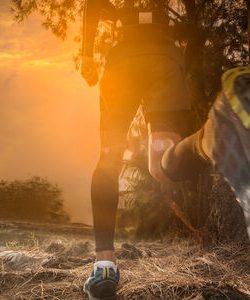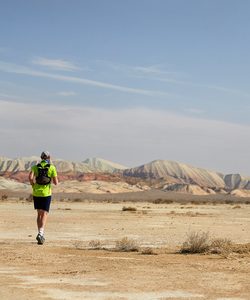There’s a point in every ultramarathon where the body stops negotiating and the mind runs out of plans.
Your fueling strategy unravels, your thoughts go dark, and you can’t find a single reason to keep moving. You count miles, but even the numbers stop making sense.
That’s the edge — the place where control ends and, if you’re honest, faith has to begin.
Beyond reason and strategy, strength no longer carries you.
You rely on trust—trust in the process, in the path beneath your feet, and ultimately, in something greater than yourself.
Heat, Loops, and Limits
As I write this, I think back to my last 100-mile race. It was unforgettable. Late into the night, somewhere around mile 70 or 80, I hit a breaking point.
The daytime heat had been relentless—blazing sun, not a cloud in the sky—and my body simply wasn’t responding the way it normally would.
My internal thermostat was completely out of balance, like the engine of a car with a broken coolant system.
The race took place on a 3.75-mile cement loop. Of course, 3.75 doesn’t divide evenly into 100, so the “100-mile race” was actually 101.25. That’s ultrarunning for you—always a little more than you expect.
Twenty-seven loops later, your legs are wrecked, your mind is stretched thin, and your sense of humor depends on how much pain you’re in. In the moment, it hurts like hell. Only afterward can you laugh at yourself.
That night, I honestly thought I was going to pass out. After more than 140 ultra-distances, I believed my body finally had enough. But instead of quitting, I discovered a strange rhythm in the chaos.
I’d stagger into the aid station overheated and ready to collapse, dunk my head in a cooler of ice water, drink until fully hydrated, wrap ice in a bandana around my neck, and place a frozen towel over my head.
Almost immediately my body would go into shock—I’d shiver uncontrollably—and that’s when I’d start running again.
Slowly my body heated up, the ice melted, and by the time I felt ready to pass out again… another 3.75 miles had passed, and I was back at the aid station. I repeated this cycle until I crossed the finish line.
That race reminded me: running 100 miles doesn’t go according to plan. It never does. You adapt to what’s in front of you and simply keep putting one foot in front of the other.
Every new distance, every new race, throws you into the unknown. And it takes courage to stand at the starting line, knowing your plans will fall apart, and yet step forward anyway.
Stepping Into the Unknown
I remember this most vividly in my very first 100-miler. It was nearly double the longest distance I had ever run, and I had no idea if I could finish.
I was completely unprepared for what came—chafing, nausea, sleep deprivation, thunderstorms, cold night temperatures, even the run-in with a mountain lion.
But I had one thing: courage.
And that courage carried me through the unknown, teaching me something profound—that beyond fear lies discovery, and that discovery is often the soul.
Life mirrors this same journey. I’ve lived in the city and the suburbs. I’ve known scarcity and abundance. I’ve seen friends fall to drugs, end up in prison, and die too young.
But I’ve also known the joy of family, the blessing of opportunities I didn’t deserve, and the grace of a life filled with love.
Through all of it—the uncertainty, the highs and lows—one truth remained: when I was at my lowest, when no one else could help, I turned to God.
And through the long, grueling miles I’ve run, I often think back to a moment when I was at my lowest—caught in a situation I couldn’t escape.
No one could help me.
That was when I realized my life was a pilgrimage. Even in chaos, I could see that God was my only way forward.
But repentance wasn’t a single moment of clarity. It wasn’t, “I’m saved, and now life is perfect.” No, it was—and still is—an ongoing turning.
The Greek word for repentance, metanoeo, means “to change one’s mind and direction.”
It is the courage to face yourself and turn toward God, even when you don’t know what the road ahead looks like.
As St. Augustine said, “The place where you found the truth is the place where you learned to stand in faith.”
And we don’t go back up the same path we came down. The path narrows, it demands more, it refines us.
Like the course of an ultra, you can’t change the terrain—but you can change how you run it. And that changes everything.
Someone once asked me, “What do you find at the end of a 100 mile ultramarathon?” My answer was simple:
“The version of me I spent my whole life running from, until I finally had the courage to face him.”
The Cross We Carry
There’s an old story about a young man carrying his cross. It was heavy and uncomfortable, so he whittled it down, painted flowers on it, and wore it proudly around his neck.
At the end of his life, he reached a great chasm. Others laid down their full-sized crosses, which bridged the gap, allowing them to cross into Heaven.
His, however, was too small. The gates closed, and he was left behind.
The lesson is clear: you cannot avoid the weight of the cross. To cut it down is to lose the very thing that will carry you across life’s greatest trials.
As Jesus said, “Whoever wants to be my disciple must deny themselves and take up their cross daily and follow me” (Luke 9:23).
And this, my friend, is the same courage required on race day—when the miles hurt most, when your body breaks down, and when quitting feels like mercy. It’s the courage to shoulder the weight, to trust that the burden itself becomes the bridge.
Because in both running and life, it’s not the absence of suffering that saves us—it’s how we carry it and keep moving forward.
Never forget this: a runner’s stamina is the result of all the struggles they are willing to overcome both inside and outside of their running shoes.
Saying Yes to Life
Courage is not about avoiding pain—it’s about embracing the unknown, step by step, scar by scar, until love carries you forward.
Because when you say yes to love, you also say yes to loss. When you say yes to caring, you also say yes to disappointment. And when you say yes to the long run, you say yes to pain. But in saying yes to suffering, you say yes to life.
“The way you do one thing is the way you do everything,” Richard Rohr writes. The way we run, the way we suffer, the way we love—it’s all part of one great pattern of grace.
In the end, the unknown is where we meet the Divine. Not in the safety of what we already understand, but in the mystery of what we can’t control. That is where courage lives. That is where faith begins.
The Remaking Path
In the end, the unknown is not our enemy—it is our meeting place with the Eternal. We are not called to perfect control, but to faithful surrender. Jesus tells us, “Whoever loses his life for my sake will find it” (Matthew 16:25).
That is the great paradox: we do not climb our way to the Holy One—we fall into Him.
The unknown is not emptiness but fullness, not loss but transformation. To step into the mystery is to discover that what we fled from was the narrow path that remakes us.
And so, mile after mile, step after step, we find the courage not only to face the unknown—but to be remade by it.
Thank you for reading, and as always, keep moving forward and enjoy the journey along the way!
If this resonates with you—if you’ve ever wondered what’s possible when you push past pain, embrace struggle, and run with nothing left to give—then Inside the Mind of an Ultramarathon Runner may be for you.
This book isn’t just about running; it’s about endurance in all its forms—physical, mental, and spiritual. It’s about transforming suffering into strength and finding freedom in the miles.
Grab your copy today and take the first step toward discovering what lies beyond your limits.







